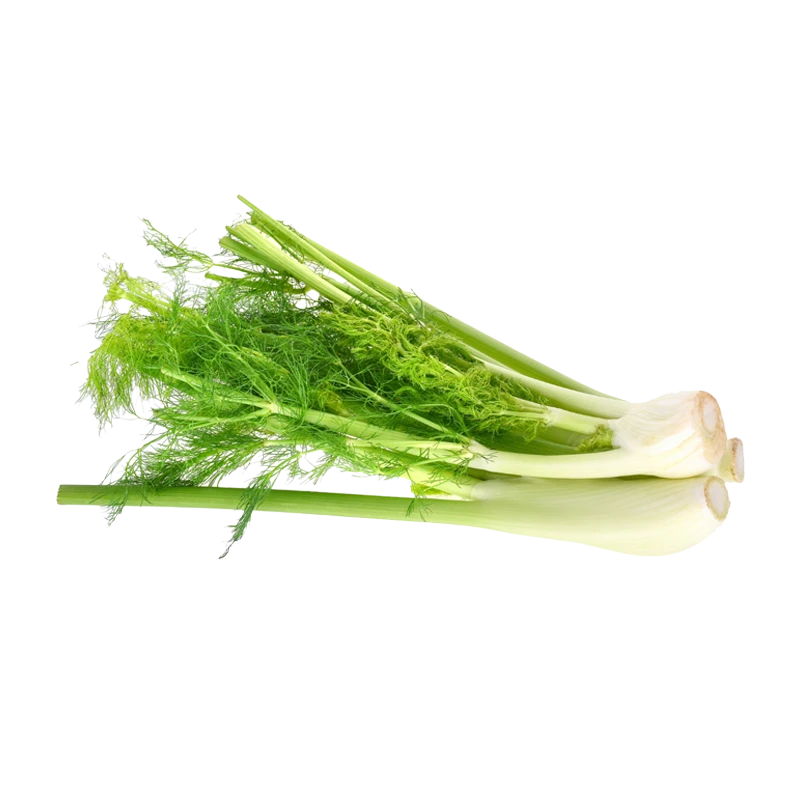Fennel — Nutrients, Health Benefits, And Shopping Tips

Written by Listonic Team
Last update on September 4, 2024
Nutrition facts
Nutrition facts
Amount per 100 g
Calories
🔥 31 kcal
| Nutrition per: 100 g | Value | % Daily Value* |
|---|---|---|
| Carbs | 7 g | 2.55% |
| Fiber | 3 g | 10.71% |
| Sugars | 4 g | 8% |
| Glycemic Index | 15 | - |
| Protein | 1 g | 2% |
| Sodium | 52 mg | 2.26% |
| Total Fat | 0 g | - |
*The % of Daily Value (DV) tells you how much a nutrient in a serving of food contributes to a daily diet. 2,000 calories a day is used for general nutrition advice.
31
🍏 Low-Calorie Foods
15
🟢 Low Glycemic Index
Did you know?
Health benefits
- Rich in vitamins and minerals such as Vitamin C, potassium, and manganese, which support overall health and well-being.
- High in fiber, promoting digestive health, regular bowel movements, and a healthy gut microbiome.
- Contains antioxidants such as flavonoids and polyphenols, which help protect the body from free radicals and reduce inflammation.
- Supports heart health by helping to lower blood pressure and cholesterol levels due to its potassium and fiber content.
- May aid in digestion and reduce bloating and gas due to its carminative properties.
- Contains phytoestrogens, which may help balance hormone levels and support women's health.
Health risks
- Potential for allergic reactions in some individuals, particularly those allergic to plants in the Apiaceae family, causing symptoms like itching, swelling, or difficulty breathing.
- Risk of digestive discomfort such as gas or bloating when consumed in large quantities, especially for those sensitive to high-fiber foods.
- Estrogenic effects as fennel contains compounds that mimic estrogen, which may interfere with hormone-sensitive conditions if consumed in large amounts.
- Potential for contamination with pesticides or harmful bacteria if fennel is not properly washed or sourced from a reputable supplier.
How to choose fennel
Fennel should have crisp, bright green fronds and a clean, bulbous base. Sniff the fennel bulb; it should emit a sweet, anise-like aroma.
Avoid fennel with split bulbs or wilted fronds, as they are signs of age or improper handling. High-quality fennel will taste fresh and slightly sweet, with a crunchy texture that is perfect for salads.

How to store fennel
Fresh fennel should be stored in the refrigerator’s crisper drawer. Wrap it in a damp paper towel and place it in a plastic bag to maintain freshness. Properly stored, fennel can last up to a week.
Excess moisture can cause fennel to become soggy. It’s important to keep it dry before storage. Avoid placing it near ethylene-producing fruits to prevent premature ripening and spoilage.
✅ Extra Tip
How long does it last?
Fennel can last for 7-10 days in the refrigerator when stored in a plastic bag or container. To maintain its freshness, keep it in the crisper drawer. Cooked fennel should be consumed within 3-5 days.
What to do with leftovers?
Leftover fennel can be used in a variety of dishes, both raw and cooked. Slice it thinly and add to salads for a fresh, anise-flavored crunch, or roast it with olive oil and herbs for a sweet, caramelized side dish. Fennel is also great in soups or stews, where its flavor mellows and adds depth to the dish.
Use fennel in a gratin with cream and cheese, or sauté it with garlic and onions as a base for pasta or grain dishes. If you have a lot of fennel, consider making a batch of fennel slaw with cabbage and a tangy dressing, or blending it into a fennel soup with potatoes and leeks. Fennel can also be grilled and served with fish or chicken, where its flavor pairs well with citrus and herbs. For a quick snack, try slicing fennel and serving it with a dip like hummus or tzatziki.
👨⚕️️ Medical disclaimer
Discover products from other categories
Listonic Team
Fact-checked
Our editorial team checked this article to make sure it was accurate at the time of publishing it.
Get the top-rated shopping list app

fennel
1 piece







